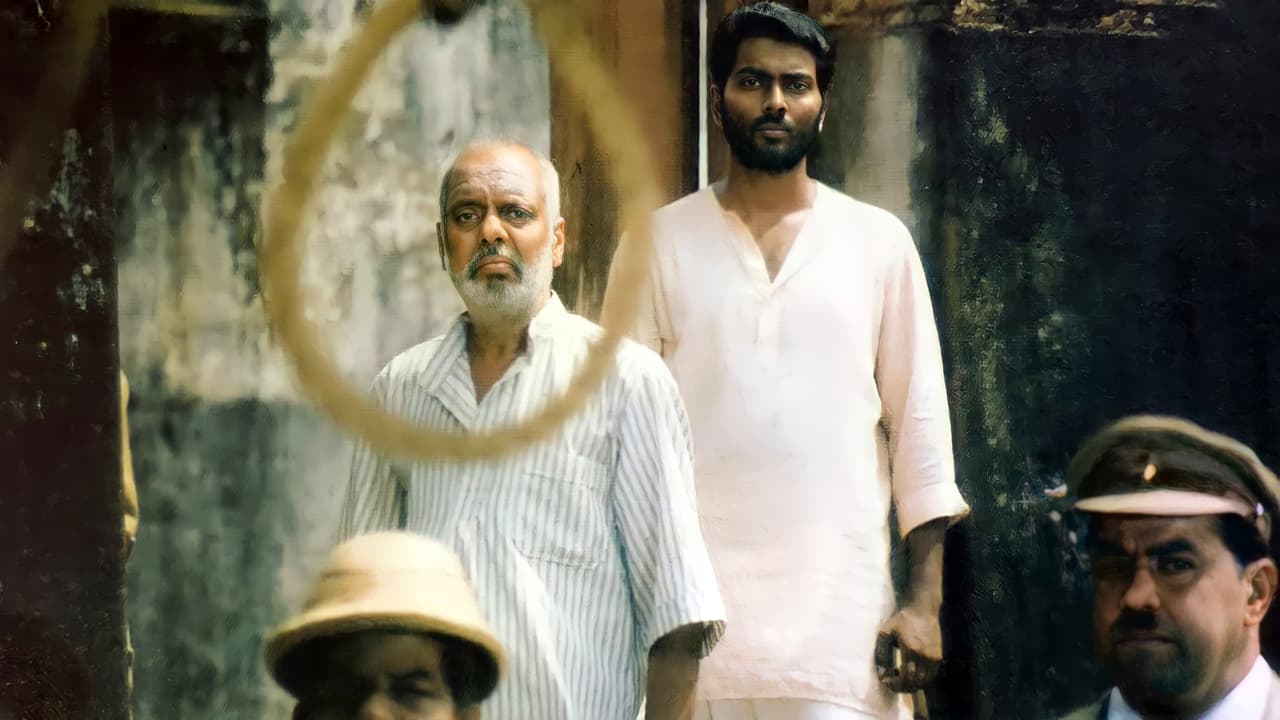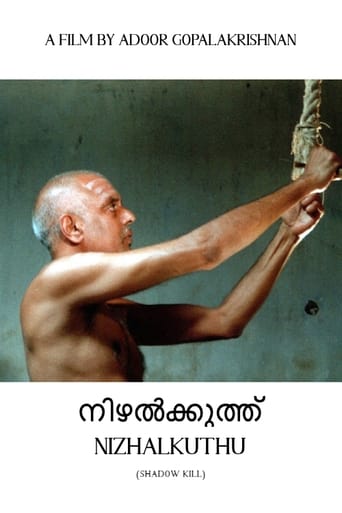



This is How Movies Should Be Made
Good concept, poorly executed.
Close shines in drama with strong language, adult themes.
View MoreThere is, somehow, an interesting story here, as well as some good acting. There are also some good scenes
View MoreThe first Malayalam-language movie that I've ever seen focuses on a hangman's questioning the moral implications of his job after learning that he executed an innocent man. Adoor Gopalakrishnan's "Nizhalkkuthu" ("Shadow Kill" in English) is set during the final days of the British occupation, although there is no mention of the British presence. There is a mention of the caste system, and the arrival of the Maharajah's officer towards the end of the movie affirms the disconnect between the lives of most Indians and those of the subcontinent's elite.I like seeing movies that show us cultures that we don't often see, in this case people's lives in Kerala. To be certain, India leads the world in movie production, but the west tends to see very few of them. We hear a lot about Bollywood, but South Asian cinema is much more diverse than that. I would like to be able to see more Indian movies, and in particular movies like this one.
View MoreThe film is beautifully taken and provides glimpses of life in the old days during the Maharaja's rule in Travancore. But more than that, it shows how a man struggles because he takes everything extremely personally.It is evident from the language used that the hangman and his family are originally from the neighbouring state of Tamil Nadu. From a sociological perspective I thought it interesting that the Maharaja had to hire someone from a neighbouring state for this dreadful job. Everyone involved, right from the Maharaja to the hangman, are aware that at some level it is a sin and they try to absolve themselves of this sin in their own ways - the Maharaja by granting pardons and the hangman by performing numerous rituals.The crux of the story however is the attitude towards duty. The hangman cannot separate the professional from the personal. He is always troubled by his past executions. On the night before the execution when an official is narrating a story, in his mind he pictures his own family. So personally does he take it, that he cannot go ahead with the execution knowing that he is going to kill an innocent boy. Contrary to this, the son - the non-violent Gandhian - calmly goes ahead with the execution.Great film.
View MoreAdoor Gopalakrishnan's Nizhalkkuthu seems to be a story about a hangman and his dilemmas, but in actuality it offers an alternative to a modern understanding of the Indian state. As it is, this movie caters for local, south Indian tastes and political sensitivities, and has little to say for others. Gopalakrishnan offers an alternative reading of the Indian freedom struggle, as part of an endless 'Leela' (mythical play), in which some innocent person has to die in order to enable others to live. This victim is a victim of the Goddess, a necessary sacrifice.When it comes to it, the hangman's son, a Gandhian, doesn't refuse to take over the hanging. This I feel, is the strongest statement made by this film: That India's freedom is not a break with the past, but the past renewing itself in a new cycle. The society depicted is 'purely Dravidian'; There are no obvious castes or pollution principles, and everyone are devoted only to Devi (although allusions to Krishna and Jesus are abundant, but probably, mostly unintended). It is interesting to see a movie whose narrative isn't modern or post-modern, but, in a way, counter-modern, offering us Leela in place of Modernity (structure in place of teleology) as the anchor of the narrative. There are some beautiful shots throughout the film showing Kerala's lush landscape, but they seem to have bored the audience around me. All in all, surprisingly political in its statement, an essential movie for Indiaphiles or post colonial academics, but perhaps not for the wide public.
View MoreSPOILERSIn the case of the death penalty, how is guilt assigned? Is it distributed equally upon the jurors who have determined guilt? Or upon the judge who pronounces the sentence? Or by the person who throws the switch on the electric chair, trips the trap door for the hanging, or inserts the needle for death by lethal injection? (And if the latter, does the skin get swabbed with an alcohol pad at the point of injection - and if so, why?) Or are the members of a country as a whole where a death penalty can be given responsible? With the rise in scientific knowledge and technology, more and more prisoners on death row - or headed there - have had their innocence affirmed.But what of those who have been exonerated only after death (or, as some would have it, state-sanctioned murder) ? Who is guilty of the miscarriage of justice?NIZHALKKUTHU (SHADOW KILL) takes place in the early 1940's. One man asks another while strolling down a path through a verdant field in southern India if the Maharajah is guilty of the death of a prisoner by execution. The answer is that royalty has worked out a rather ingenious way to circumvent any guilt or sin in the situation. Just before the condemned man is executed, the Maharajah gives a complete and full pardon. But by the time the official messenger arrives with the message, the execution has already happened."So who is guilty then?"The response to this question is silence. The two men have been talking about The Hangman of that region, Kaliyappan. While this official position accords many benefits from the Maharajah, it tends to put The Hangman (and his family - the position is passed on to the son) at a distance from society. But in a hanging not long ago an innocent man was executed. This event has been hanging heavily on The Hangman, who has fallen into heavy drinking as a way to dull the guilt he feels.His official position includes an important function as a healer. After a criminal is hung, the rope used is suspended in his home over an altar to Kali. Those who are sick come to him. He cuts strands from the rope, burns them while making supplication to Kali, and applies the resulting holy ash to the infirm person. Whatever anguish he is feeling hasn't affected his healing powers; they seem even more robust.But when news of another hanging is brought by an official, The Hangman pleads that he is not well - can't it be postponed until he is feeling better? The official notes all the benefits from The Hangman's position, and, after all - it's not such a strenuous thing - things must proceed as planned. Who has ever heard of an execution being postponed?His wife and son assist him with the necessary ablutions before execution. His son Muthu accompanies him to the place where the execution will take place the next day. They sit with other officials that evening. Muthu is there, ostensibly supporting his father, although he sits apart from his father and the others. He seems even further removed in spirit. He has been doing some work with followers of Ghandi; perhaps he is disquieted somewhat by his father's occupation. He does not join the circle until admonished by the others, and his joining in the ritual drinking is decidedly reluctant. The night before the hanging, Kaliyappan says he is very tired and doesn't think he can stay awake. But he is told he *must* stay awake - the person to be hanged will no doubt not sleep the night before his execution - and neither should The Hangman. They begin telling stories to keep him awake.The first is not received very well. One official has a story, but wonders if he should tell it. It is a story of a beautiful young woman who was brutally raped and murdered. The storyteller is quite accomplished, with many details of the beautiful young girl just into womanhood who falls in love with a handsome young man and whose feelings are reciprocated. He is without family, having been orphaned at a young age. The story goes on for quite some time - a somewhat impatient listener gets reprimanded for asking at a particularly suspenseful moment if the villian was the young man. No, it was the brother-in-law of the young woman. He had never taken notice of her as a child but began lusting after her when she came of age. One day the husband followed her as she went out in the countryside to meet the young man.The young man is quite proficient in playing the flute. He begins to teach her. He leaves for a brief time; the brother-in-law commits the offenses. Although the young man is innocent, the broken flute at the scene points to him as the guilty party. Although everyone knows he is innocent, he has no family to defend him, no money for a lawyer - none of the privileges of the real perpetrator.Partly into the story, Kaliyappan - who has continued drinking heavily, seems to give a start of recognition. The others ask him about his reaction but he shrugs it off. When the storyteller seems to have finished his tale Kaliyappan asks him what eventually happened to the young man - was his innocence confirmed?The storyteller reacts as if Kaliyappan is a bit slow on the uptake; the young boy is the prisoner whom The Hangman will shortly be executing.At this revelation, Kaliyappan quivers slightly and topples to the earth. The officials are in a quandry - the execution must be carried out - the son must be pressed into the service of his father's job.The screen fades to black. A voice tells that this is what has happened. The innocent man was executed. The pardon arrived not long after.
View More